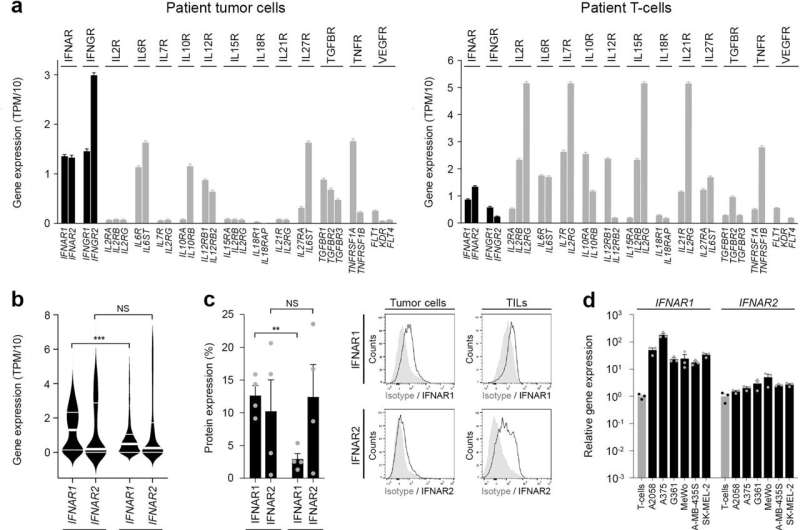This article has been reviewed according to Science X's editorial process and policies. Editors have highlighted the following attributes while ensuring the content's credibility:
fact-checked
peer-reviewed publication
trusted source
proofread
Exploring key regulators of programmed cell death in melanoma and the immune system's response

A new paper published in the journal Nature Communications explores programmed cell death (PD-1) in melanoma cells and the immune system's response.
Immune checkpoint inhibitors are cancer fighting drugs that help the immune system do its job of detecting and attacking tumor cells. Programmed cell death 1 (PD-1) is a common target for this type of drug—it is a protein that sits on the surface of T cells and helps regulate the immune system's response to neighboring cells, both normal and cancerous. While most research efforts to date have focused on PD-1's role in T cells, it is also active in many other kinds of cells—including cancer cells, as first demonstrated by the Schatton laboratory at Brigham and Women's Hospital.
The researchers aimed to define the molecular mechanisms controlling PD-1 expression and its therapeutic targeting in melanoma cells. The team identified a melanoma cell-intrinsic type I interferon-JAK/STAT signaling circuit regulating the amount of PD-1 in tumor cells.
They further discovered that inhibition of this pathway not only reversed induction of PD-1 in melanoma cells, but also reduced the efficacy of PD-1 checkpoint therapy. The work thus cautions against combining JAK or IFNAR antagonists with PD-1 inhibitors, given that this regimen may weaken the effectiveness of immune checkpoint monotherapy.
This work builds off previously published studies identifying PD-1 as a tumor cell-intrinsic growth promoting receptor in melanoma and Merkel cell carcinoma, the inhibition of which suppresses cancer progression. Here, researchers newly define a regulatory pathway controlling PD-1 levels in melanoma cells and how inhibition of this pathway unintentionally disrupts therapeutic efficacy of immune checkpoint blockade. These findings could be used to optimize immunotherapeutic responses for patients with melanoma, and potentially even other cancer types.
To understand the mechanisms that govern PD-1 checkpoint expression in melanoma cells, the researchers focused on established cytokine networks known to regulate PD-1 in immune cells. They hypothesized that these mediators would have a similar role in modulating melanoma cell-PD-1 levels.
Through their work, they discovered that a type I interferon cytokine pathway intrinsic to melanoma cells critically controls tumor cell-PD-1 expression. They also found that disruption of type I interferon signaling reduces melanoma-PD-1 expression and resultant efficacy of immune checkpoint therapy.
Type I interferon antagonists, including JAK inhibitors and IFNAR1 antibodies, currently prescribed in the clinic for multiple autoimmune conditions such as psoriasis, atopic dermatitis, vitiligo and lupus may potentially suppress the efficacy of PD-1 immune checkpoint therapy. The work thus raises concern over using PD-1 checkpoint antibodies (e.g. nivolumab or pembrolizumab) with JAK inhibitors (e.g. ruxolitinib, utabacitinib, deucravacitinib) or IFNAR1 antibodies (e.g. anifrolumab).
Next steps include dissecting roles of type I interferon signaling and inhibition not only in melanoma cell-PD-1 expression, targeting, and checkpoint efficacy, but also in additional cancer types as well as in diverse immune and non-immune cell lineages within the tumor microenvironment.
Identifying additional regulatory networks controlling tumor cell-PD-1 expression and their effects on immunotherapeutic outcomes are also major thrusts of ongoing research. The overall goal is to leverage these findings to improve immune checkpoint therapeutic responses in cancer patients.
More information: Julia Holzgruber et al, Type I interferon signaling induces melanoma cell-intrinsic PD-1 and its inhibition antagonizes immune checkpoint blockade, Nature Communications (2024). DOI: 10.1038/s41467-024-51496-2



















